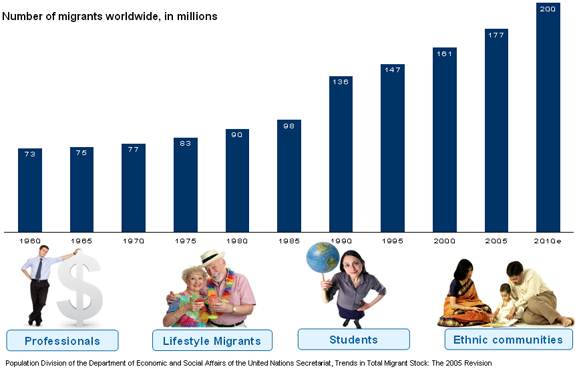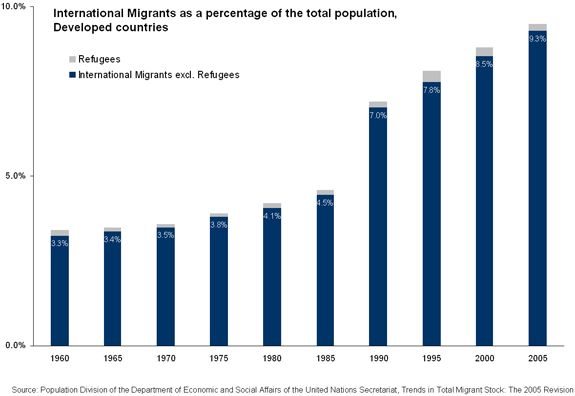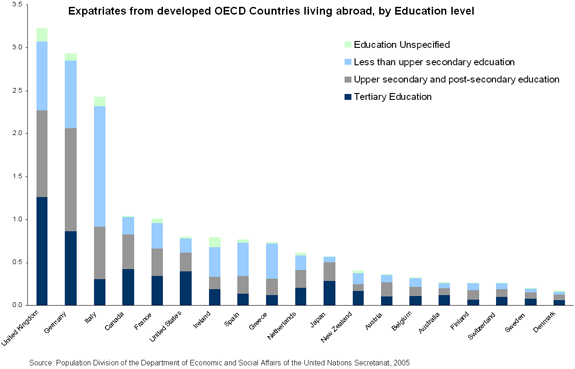Expatriates worldwide
How many expats are there?

In 2010, more than 200 million people will be living abroad. While the number of worldwide expatriates increases, it is hard to quantify the exact size of the worldwide expatriate market.
Depending on the exact definition of expatriates, the following groups of international migrants can be counted as part of the expatriate market:
- Professional working abroad, often on limited length assignments (some people restrict the term expatriates to this group)
- Lifestyle migrants that move abroad in search of a better way of life. This includes the increasing number of pensioners that move to hotter countries, because of the climate and lower cost of living
- International students studying abroad
- Economic migrants, people that move abroad for economic reasons as they can earn significantly more money and/or have an improved standard of living

The number of people moving country is increasing across all expatriate categories - irrespective of motivation, geographic origin and social background. While the percentage of migrants in the total population of developed countries continues to increase, there are also an increasing number of expatriates from developed countries that move abroad for professional or personal reasons.
Expatriates in developed countries
In developed countries, expatriates and migrants now account for almost 10% of the total population, making them an attractive target group for many industries. However, the countries with the highest percentage of expatriates are in the Middle East. In the United Arab Emirates, expatriates make up more than 70% of the total population, followed by Kuwait with more than 60% (United Nations, 2005 ). In Europe, the country with the highest ratio of expatriates is Luxembourg (more than 30% of total population), followed by Switzerland (more than 20%).

When it comes to total numbers, the US is leading the worldwide ranking with more than 38 million expatriates living there, followed by the Russian Federation (12 million) although this figure is skewed by nationals from former USSR states. In Europe, the ranking is led by Germany with more than 10 million foreigners living there, followed by France. However, this picture might change significantly in the future; Germany and France host a lot of migrants that have moved there over the last few decades, the country with the highest number of inbound arrivals is today Spain.
Irrespective of their exact number, expatriates and migrants have become an increasingly important socioeconomic factor in developed countries, changing cultural habits and the rules of economics and marketing. This trend is likely to continue in the future, with more and more developed countries becoming multicultural societies.
Expatriates from developed countries
The increase of worldwide mobility doesn’t only effect inbound migration to developed countries, there are also an increasing number of expatriates from developed countries moving abroad.
Within the OECD, the country with the highest number of expatriates is the UK. More than 3 million British expatriates now live abroad and the trend towards expatriation seems to be accelerating. It is not surprising that British companies are also leading the way when it comes to creating special expatriate services. As an example, many of the worldwide expatriate health insurance companies and expatriate banking providers are based in the UK. Despite their original focus on British expatriates, these companies are now serving many expatriates from other countries as well, often fulfilling the needs that are not covered by service providers from companies in their home country.
A good example of an underdeveloped expatriate market are German expatriates. Although Germany is the OECD country with the second highest number of expatriates (almost 3 million Germans living abroad) the amount of companies serving German expatriates is still very limited. Since many German expatriates speak English as a second language, they therefore turn to British providers for specialized expatriate services. As the number of worldwide expatriates continues to increase, it is likely that an increasing number of international companies will create special products, services and expatriate media to serve the needs of this target group.
